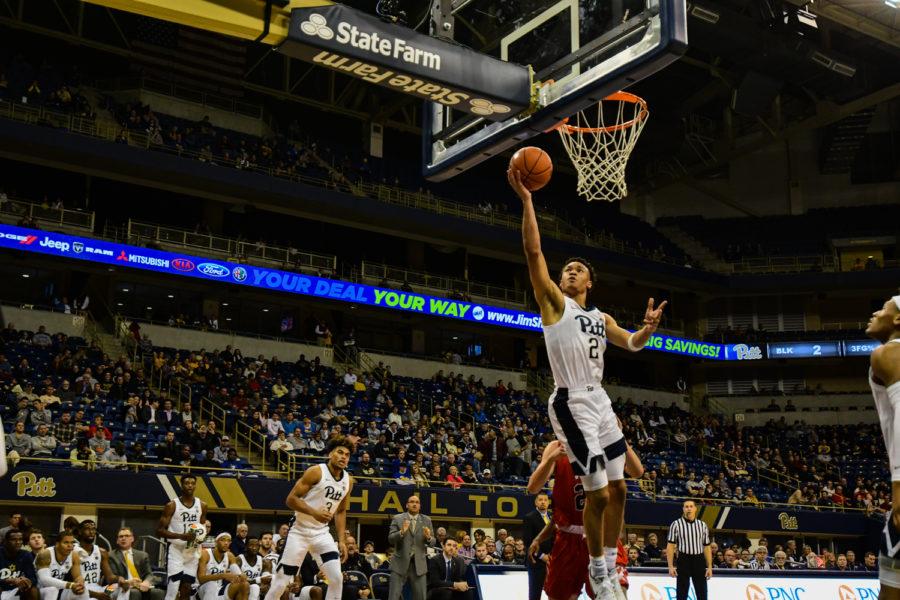Looking ahead at Pitt basketball’s ACC schedule
Bader Abdulmajeed | Staff Photographer
First-year guard Trey McGowens (2) drives in for a layup against Virginia Military Institute during Pitt’s 94-55 victory Nov. 9, 2018.
January 9, 2019
The Pitt men’s basketball team began its conference schedule this past Saturday by hosting perennial powerhouse North Carolina, currently ranked No. 12 in the nation. A sellout crowd flocked to the Petersen Events Center hoping to see David take down Goliath, but it wasn’t meant to be — UNC eventually overwhelmed the young Panthers with slick shooting and smothering defense, blowing them out 85-60.
The Panthers impressively maneuvered through their non-conference schedule with a 10-3 record, with two of those losses coming by just one point. But Saturday’s game was a harsh reminder that Pitt plays in the ACC — the nation’s toughest basketball conference, with six of its 15 teams ranked in the top 15 of the AP poll.
On the bright side, if the Panthers win just one of their next 17 games, it will be an improvement over last season, when they went winless in conference play for the first time ever. With a crop of young talent and a capable head coach in Jeff Capel, it’s likely that they will win a handful of games. Let’s break down the Panthers’ remaining ACC schedule based on difficulty, frequency and likeliness to beat each opponent.
No. 1 Duke — One home matchup Jan. 22.
Last year’s Pitt team drew the unfortunate assignment of playing Duke twice. They predictably lost each matchup by margins of 87-52 and 81-54, respectively. This year, the Panthers dodged a bullet by drawing the Blue Devils just once. You can chalk this game up as a Pitt loss — the only questions will be by how much and to what degree of embarrassment.
Duke boasts a nearly unstoppable trio of first-year talent, as Coach K managed to snag the nation’s first-, second- and fifth-ranked prospects. There’s do-it-all guard RJ Barrett, already the ACC’s leading scorer at 22.9 points per game. There’s sharpshooter Cam Reddish, whose size and shooting ability make him an ideal NBA prospect. And then there’s the 6-foot-7, 285-pound wrecking ball Zion Williamson, who has been in the national spotlight since early high school for his prodigious dunking ability.
The Pete will likely sell out once again, with fans hoping to catch a glimpse of these three superstars on their one-year college tour before making their way to successful NBA careers. The undersized Panthers will be mismatched across the board, whether it’s 6-foot-3 first-year guard Trey McGowens matching up with the 6-foot-7 Barrett, or 225-pound junior center Kene Chukwuka getting bullied by Williamson in the paint. The best Pitt can hope for is to slow down the pace, minimize the deficit and not get put on the wrong side of a Williamson highlight reel.
Zion. Williamson.pic.twitter.com/6EStSH3hig
— For The Win (@ForTheWin) January 6, 2019
No. 4 Virginia — One away matchup March 2.
Once again, the Panthers luck out by having to face one of the ACC’s toughest opponents just once. The Cavaliers are an undefeated 13-0 so far, but their toughness lies in their strategy rather than their athleticism. Head coach Tony Bennett is known for implementing a gritty system that typically leads the NCAA in total defense and ranks toward the bottom in pace.
Virginia has proven that they can lose to anyone on any given day — just ask University of Maryland-Baltimore County, which became the first No. 16 seed to ever beat a No. 1 seed in the NCAA Tournament when it shockingly took down the Cavaliers last March.
But this year’s Virginia team is a year older, with junior veterans Kyle Guy, Ty Jerome and Braxton Key hungrier than ever after last year’s embarrassing tournament exit. They also boast an athletic playmaker in 6-foot-7 redshirt sophomore guard De’Andre Hunter. This combination of experience and talent will make it all but impossible for the scrappy — but often sloppy — Panthers to pull off an upset.
No. 9 Virginia Tech — One home matchup Feb. 16.
The Hokies are led by the three-headed monster of sophomore guard Nickeil Alexander-Walker, senior guard Justin Robinson and redshirt junior forward Kerry Blackshear Jr. The trio has led Virginia Tech to a hot start in the ACC, beating its first two conference foes by double digits.
The Hokies are a sound team, but not necessary spectacular. They boast neither the athleticism of Duke nor the team experience of Virginia. It’s entirely probable that Virginia Tech beats Pitt, but the matchup is ripe for upset potential. McGowens and fellow first-year guard Xavier Johnson have shown the potential to play lockdown defense and they could give the similarly sized Robinson and Alexander-Walker trouble. If the Panthers utilize a team approach to keep the 6-foot-10, 250-pound Blackshear from dominating in the paint, then this game could come down to the wire.
No. 13 Florida State — One home matchup Jan. 14.
Florida State is similar to Virginia Tech in that the Seminoles have a solid program year in and year out. This year, the team is led by the senior combo of Terance Mann and Phil Cofer. FSU lacks a standout scorer — instead, eight different players average between 7 and 12.1 points per game.
Although it would be very difficult for the Panthers to beat both Virginia Tech and FSU, it’s probable that they will manage to steal one of these two games. Pitt actually has the defensive advantage over FSU, holding opponents to just 37.8 percent shooting from the field, while the Seminoles allow a friendly 42.4 percent.
No. 15 NC State — Away matchup Jan. 12, home matchup Feb. 9.
The Wolfpack can score points. The team averages a whopping 89.2 points per game, placing it fourth in the country, and it’s scored at least 95 points on seven different occasions. The Panthers have done so just twice.
With the win, @PackMensBball is now 13-1 on the season. It’s the best start for the NC State men’s basketball since the 1973-74 team went 30-1 and won the National Championship.
— Craig Hammel (@Hammel_Craig) January 4, 2019
But NC State’s penchant for pushing the pace could play right into Pitt’s hands, as Capel’s group likes to turn rebounds and steals into quick fast-break points. The Panthers’ youth will struggle against the senior leadership of leading scorer and rebounder Torin Dorn, but their defense should keep them in each of these two games. In an absolute best-case scenario, the Panthers split their two meetings with the Wolfpack.
Syracuse — Away matchup Jan. 19, home matchup Feb. 2.
As long as head coach Jim Boeheim is at the helm for Syracuse — as he has been since 1976 — the Orange will always be a nationally relevant team. It doesn’t boast a ton of talent besides junior standout Tyus Battle, junior forward Elijah Hughes and sophomore forward Oshae Brissett, but the Orange’s patented 2-3 defense, which forces opponents into shooting deep shots, could stifle Pitt’s offense. The Panthers shoot an ugly 33 percent from 3-point range — ranking 222 out of 353 Division I teams. It wouldn’t be a surprise if Pitt went 0-2 against Syracuse.
Louisville — Home matchup Jan. 9, away matchup Jan. 26.
The Cardinals are essentially a one-man show, as 6-foot-8, 215-pound first-year forward Jordan Nwora leads the team with 17.9 points and 8.3 rebounds per game. Outside Nwora, Louisville doesn’t exactly stand out in any single aspect or statistical category. The Panthers can only improve from their two showings against Louisville last season, when they lost by 26 and 34 points, respectively.
Clemson — Away matchup Jan. 29, home matchup Feb. 27.
Physically, Pitt matches up well with Clemson. The Tigers, like the Panthers, are undersized — senior Elijah Thomas leads the team in rebounds as a 6-foot-9 big man. However, Clemson will have the best player on the court in graduate guard Marcquise Reed, who ranks fourth in the ACC with 19.6 points per game. Thomas, meanwhile, leads the conference in field goal percentage, giving the Tigers a potent 1-2 punch that will cause problems for Pitt.
Notre Dame — One home matchup March 9.
It’s beginning to look like a down year for Notre Dame. The Fighting Irish lost to lowly Radford University earlier in the season, and their first two ACC games have shown that loss wasn’t a fluke. They opened their conference schedule by losing to Syracuse and Virginia Tech, both by double digits. It’s tough to tell just where Notre Dame and Pitt will stand by the time they meet for this season finale, but it’s altogether likely that they enter as equals, giving Pitt a slight home court advantage.
Miami — One away matchup March 5.
The Hurricanes also appear to be on the decline, stumbling through their non-conference schedule with losses to Yale and Penn before falling in each of their first two ACC games. It’s tough to win a lot of games when your leading scorer is 5-feet-7-inches tall, as is the case with Miami sophomore guard Chris Lykes. Pitt could almost be favored to win this game.
Boston College — One away matchup Feb. 12.
The Eagles are led by junior guard Ky Bowman, who ranks second in the ACC with 20.4 points per game. Their season has been mediocre so far, with a 9-4 overall record, which includes a loss to lowly IUPUI. But if Bowman gets hot from the field, you can write this up as a loss for the Panthers.
Georgia Tech — One away matchup Feb. 20.
Georgia Tech joins Pitt and Wake Forest in the basement of the ACC, with the preseason media poll projecting them as third-worst team in the conference. Like Boston College, they stumbled through their non-conference slate with a 9-4 record. The Yellow Jackets are a very beatable team — just ask Gardner-Webb University, who beat them by double digits. This matchup is another great opportunity for Pitt to get their first conference win since 2017.
Wake Forest — One away matchup Feb. 5.
How bad is Wake Forest? Well, Georgia Tech beat them by 13 and their non-conference schedule included losses to Houston Baptist and Gardner-Webb University. The preseason ACC poll had the Panthers finishing No. 15 and the Demon Deacons No. 14 in the conference, but it’s safe to say they messed that up. Wake Forest is a bad team that Pitt should be favored to beat head-to-head and finish ahead of in the standings.
Wake Forest is just never going to get better at pick and roll (offense or defense). It’s just so bad on both sides of the ball. It’s so inexcusable too because it’s so coachable.
— Riley Johnston (@BSD_RaJohnston) January 9, 2019








